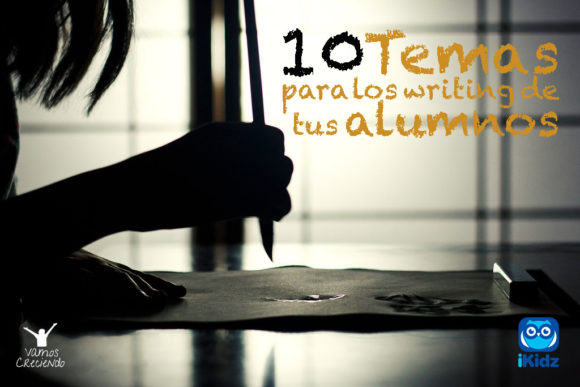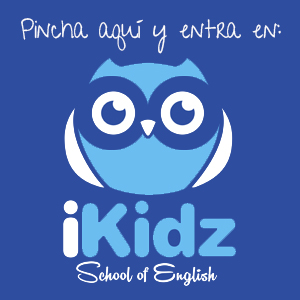
photo credit: ot0rip604 Written -Sho- via photopin (license)
As English teacher, one of the main problems I sometimes encounter, It is the lack of ideas or resources in class.
As you know, in iKidz We do not use books, and we generate materials according to the needs of our students. That makes the head is constantly working, generating materials, new ways of teaching, to motivate and capture the attention of our kids. But, obviously, often just ideas, and sure as profe, You will pass you need inspiration for certain aspects of your class.
This happens to me when my students ask for their writing topics. Therefore, I decided to investigate a little and make a list of issues that I think they are coming great. Most of these issues I have taken a series of articles that The New York Times, periodically publishes, encouraging teens to write on your page.
If this post is short pop you left in your web and you will find many more ideas 😉
Childhood memories.
- What things did you create when you were a child?
With an issue like this we will help our students remember moments of creativity from his childhood. If any of your students tells you that never created anything, You can ask them to write about something they would like to create, or who have created if they could.
Some questions that can help you guide your writing:
- What do you remember best about the things you created when you were a child?
- How old were you?
- What materials did you use?
- Did you create secret spaces like pillow forts where you could retreat, or construct inventions or child-sized versions of real things out of cardboard?
- Did you write stories, put on plays, invent potions or your own recipes?
- Was there a toy you wanted as a child but never got?
Like kids, we always have the "thorn" of a toy that we would have had and we had, Ask your students for the desired toy, You'll see how many ideas come and even some debate.
Some questions to encourage:
- Was there a toy in your childhood that you wanted but couldn’t have for some reason?
- Why couldn’t you have it? Why did you want it so much?
- What was your favourite toy of all the toys you did own?
- What toy, piece of technology, or any other resource do you wish your neighbourhood or school library would lend?
- What’s the best gift you’ve ever given or received?
insurance, like the toy desired, all have the memory of a gift that you marked. Your students will not be less and this topic will help them express.
If you see them tear costs, planteadles any of the following questions:
- Why was it so memorable?
- What do you most want to give or receive this year? Why?
- What nicknames have you ever gotten or given?
Motes are very common when we sin, and often they accompany us throughout life. Sure your students had or have a nickname. If not so, ask them what would that would have liked to have:
- What nickname do you wish you had? Why?
Family.
- What have you and your family accomplished together?
Obviously, Family is one of the fundamental bases in the education of our students. It's no secret that the affective and emotional development of students depends, to a large degree, how is your family and how cohesive is. This question is a good way to dig a little bit about how your family is and what students have done together.
- What you and your family have accomplished by working together?
- Is there something you’d like to do? How would each person contribute?
- Does any other person or family motivate you to try something new or difficult? Why?
- How do you define ‘Family’?
This question can bring enough "crumbs", but I think it's great, not only to encourage your students to write, also to know where you stand against family and, indirectly, know how his own family.
- How you define “family”? Why?
- Do you think a new definition of family is starting to emerge in our society? If so, how do you see that in your own life or community?
- How are you and your parents alike and different?
Parents and teachers always make comments like "It's like his father / mother", but, To what extent are our students or children aware of this?
I think I have included this question because I find it interesting to see the perspective of our students, Regarding the relationship they have with their parents and the characteristics that unite or disunite.
If you ask this question falls short, ask them how they see their relationship in the future:
- What do you expect your relationship with your parents to be like when you get out on your own?
- If you are already on your own, how has your relationship changed?
- How do your parents’ expectations for you influence your decisions?
- Do your parents support your learning?
Surely this question interests us more than anything else the profes ... right?
I'm wanting to know what my students say ... 😉
If your students do not want to "wet" too, or they run out of ideas and simply respond with a yes or no, planteadles the following questions:
- How you feel about your parents’ role in your education?
- Did your parents read to you when you were young?
- Do they take an interest in your schooling now?
- Do they do things like checking in with you about homework, rewarding you when you do well or talking about what you are learning?
- Do you think you would perform better in school if your parents took greater interest in your education?
Personality.
- What are you good At?
This is an issue that can work with older students because it requires quite self-analysis by students. To guide them a little bit and make it easier choice questions Make them:
- How and when did you first realize you had this aptitude?
- How do you use your skills and talents?
- How have your peers and adults reacted to your abilities?
- Are you passionate about the things you are good at?
- Can you put your skills in service of others?
- What are you afraid of?
This is an issue that can work with students of almost any age. Small will probably say things like darkness or certain animals, and by age pureed fears of your students will be more complex.
Perhaps before starting the writing, you can work vocabulary related to the most common phobias.
Common phobias include the fear of:
- Blood, injections, and other medical procedures.
- Certain animals (for instance, dogs or snakes).
- Enclosed spaces.
- High places.
- Insects or spiders.
Some few questions help guide your students with their writing:
- What you’re afraid of, and why?
- How do you deal with your fears?
- How do they affect your life?
- Are you the kind of person who enjoys horror stories and movies or scaring yourself in other ways? Why or why not?
I hope that all these issues will help you better organize your English class and, above all, encourage writing among your students.
This year I took a few days off for Easter, So until the day 23 we will have a new post.
If you have the privilege to go a few days I hope you enjoy them. If you get stuck working I send a lot of encouragement. See you around!
Thanks for being there!
“Reading makes a full man; the conversation, agile, and writing, need.”
Sir Francis Bacon
Tags: Education, Write, class ideas, english, teachers, means, issues, temas writing, topics, Writing


 Español
Español English
English Français
Français Deutsch
Deutsch 中文(简体)
中文(简体) Português
Português
